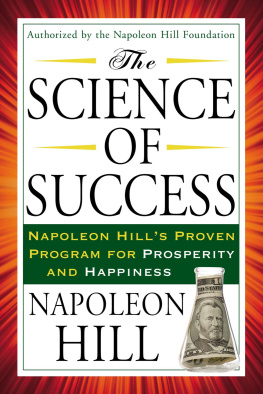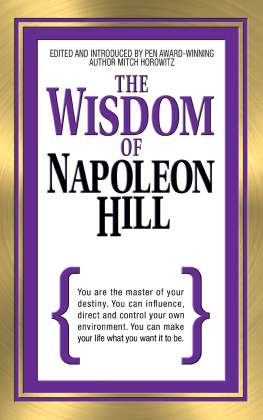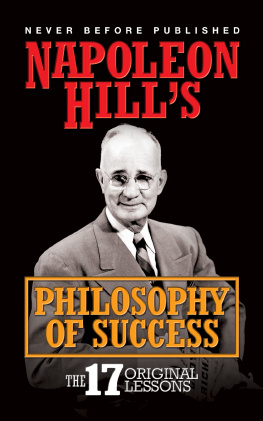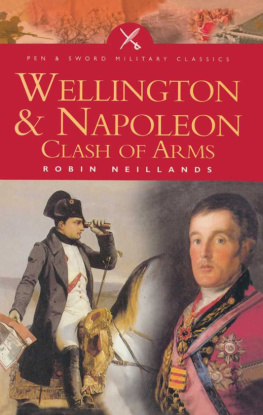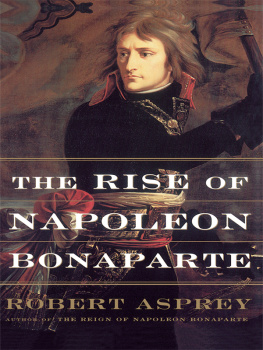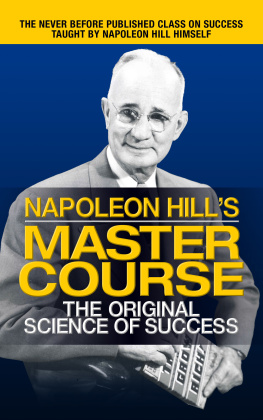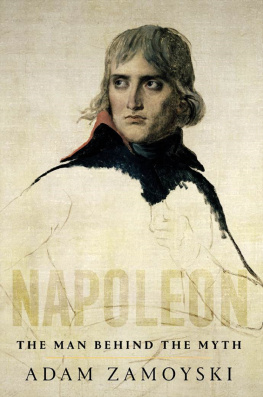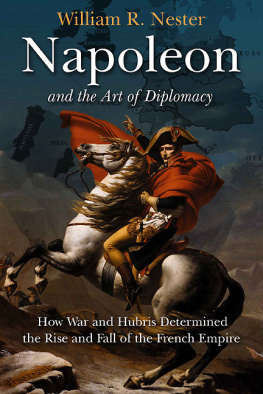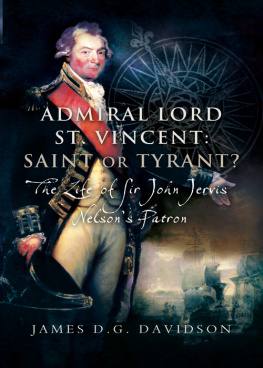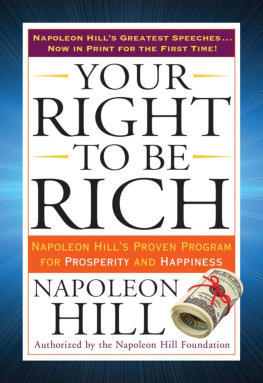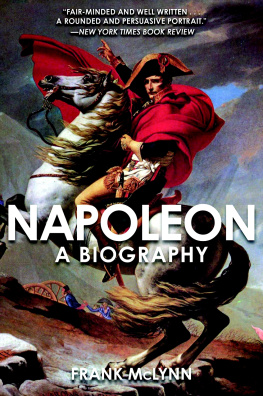Vincent Cronin - Napoleon
Here you can read online Vincent Cronin - Napoleon full text of the book (entire story) in english for free. Download pdf and epub, get meaning, cover and reviews about this ebook. year: 2017, publisher: HarperCollins Publishers, genre: Non-fiction. Description of the work, (preface) as well as reviews are available. Best literature library LitArk.com created for fans of good reading and offers a wide selection of genres:
Romance novel
Science fiction
Adventure
Detective
Science
History
Home and family
Prose
Art
Politics
Computer
Non-fiction
Religion
Business
Children
Humor
Choose a favorite category and find really read worthwhile books. Enjoy immersion in the world of imagination, feel the emotions of the characters or learn something new for yourself, make an fascinating discovery.

- Book:Napoleon
- Author:
- Publisher:HarperCollins Publishers
- Genre:
- Year:2017
- Rating:5 / 5
- Favourites:Add to favourites
- Your mark:
- 100
- 1
- 2
- 3
- 4
- 5
Napoleon: summary, description and annotation
We offer to read an annotation, description, summary or preface (depends on what the author of the book "Napoleon" wrote himself). If you haven't found the necessary information about the book — write in the comments, we will try to find it.
First published in 1971, Vincent Cronins classic biography of Napoleon is now available as an ebook for the first time. I wanted to find a Napoleon I could picture as a living, breathing man. Vincent Cronin superbly realises his objectives in this, probably the finest of all modern biographies of Napoleon. It is generally regarded as the authors masterpiece. This edition does not include illustrations.
Napoleon — read online for free the complete book (whole text) full work
Below is the text of the book, divided by pages. System saving the place of the last page read, allows you to conveniently read the book "Napoleon" online for free, without having to search again every time where you left off. Put a bookmark, and you can go to the page where you finished reading at any time.
Font size:
Interval:
Bookmark:
FOR
CHANTAL
WHEN Napoleon first set foot on the deck of an English warship, he watched the sailors heaving the anchor up and setting the sails, and he remarked how much quieter the ship was than a French ship. Six times quieter, he reckoned. The book that follows is quieter than most books about Napoleon in the sense that there is less gunfire. It is a biography of Napoleon, not a history of the Napoleonic period, and biography, I believe, should deal with events that throw light on character. Not all Napoleons battles do that, and Napoleon himself declared that on the battlefield he counted for no more than half: It is the army that wins the battle.
But why a new biography at all? For two reasons. First, since 1951 new material has come to light of great importance, not in the sense that it adds fresh details here and there, but because it obliges us to take a fundamentally new look at Napoleon the man. This material is: the Notebooks of Alexandre des Mazis, Napoleons closest friend in his youth, Napoleons letters to Dsire Clary, the first woman in his life, the Memoirs of Louis Marchand, Napoleons valet, and General Bertrands Boswellian St Helena diary. None of this, save the last part of Bertrand, has been published in England. Also important is the long-missing central section of Napoleons autobiographical story, Clisson et Eugnie, into which a frustrated young officer of twenty-five poured his aspirations, and which is here published for the first time.
The second reason is more personal. There are in existence a large number of Lives of Napoleon and, though it will sound presumptuous, I was dissatisfied with their picture of Napoleon. I could not find a living, breathing man. Always to my mind there were glaring contradictions of character. To take one example from many, biographers repeat Napoleons phrase: Friendship is only a word. I love no man. But at the same time it was obvious from their own pages that Napoleon had many close friends, more I reckon than any ruler of France, and that he was as fond of them as they were of him. Many of the biographers were evidently embarrassed by this seeming contradiction, and they tried to explain it by saying that Napoleon was different from other men: Napoleon was a monster of egoism, or Napoleon was a monster of insincerity.
I for one do not believe in monsters. I wanted, as I say, to find a Napoleon I could picture as a living, breathing man. I knew of course that widely divergent opinions were only to be expected about Napoleons public life, but about the facts of his personal life there was no reason to expect divergency. So I began to look at the sources. I found that a surprising number of the sources generally used were, to say the least, of dubious value. Napoleons phrase, Friendship is only a word, occurs only in the Memoirs of Bourrienne, Napoleons former secretary. Now Bourrienne embezzled half a million francs from Napoleon, had to be posted abroad, where he embezzled a further 2 million, and finally had to be dismissed the service. After Napoleons fall he rallied to the Bourbons, but again had to be dismissed for dishonesty. In order to help pay his debts he decided to publish his Memoirs. Bourrienne did not write them, though; he only supplied notes for part of them, and these were then ghosted by a journalist favourable to the Bourbons. Shortly after publication Bourrienne had to be shut up in a lunatic asylum. Immediately after his Memoirs appeared a group of men in a position to know published a book of 720 pages entirely devoted to correcting Bourriennes errors of fact. That admittedly is an extreme example but there are eight other Memoirs which no jury in an English court of law would accept as fair evidence; yet these have been drawn on again and again by biographers.
As I continued my critical evaluation of sources which appears as Appendix A I was able to clear up many of the contradictions that had puzzled me. But in the process I found that I had to modify my previous opinion of Napoleon. Different qualities, different defects began to emerge, and it was then that I decided to try to write a new Life of Napoleon, one of the first to be based on a critical evaluation of sources, which would also combine the new material I have spoken about earlier. It would be more concerned with civil than with military matters, because Napoleon himself gave more time to civil matters. Even as a second lieutenant Napoleon cared more about social improvements at home than conquests abroad, and though circumstances caused him to fight during most of his reign, he always insisted that he was primarily a statesman. In describing Napoleons constructive work, and even his thwarted intentions, I have drawn wherever possible on the diaries or Memoirs of the men who knew him best: such as Desaix in Italy, Roerderer during the Consulate, Caulaincourt during the last years of Empire.
Napoleon once dreamed he was being devoured by a bear. That, and two other dreams one about drowning, the other about Josephine are all we know about his dream life. But Napoleon was, among other things, a bookworm. During his leisure moments, whether at Malmaison or on campaign, he could usually be found deep in a book, and we know exactly which books and plays moved him. These I discuss in some detail, believing that, like dreams, they throw light on his longings and fears.
I have used the following manuscripts in public collections: in the Bibliothque Thiers the rich collection formed by Frdric Masson, including the journal of Dr James Verling, who lived in Longwood from July, 1818 to September, 1819, and the unexpurgated copy of Gourgauds diary: both provide valuable details about Napoleons health and morale; in the Institut de France, the Cuvier papers, which show how Napoleon organized education; in the Public Record Office, Lowes dispatches to Lord Bathurst and the Foreign Office papers relating to Switzerland, which clarify the rupture of the Treaty of Amiens; in the British Museum, two short Napoleon autographs; the Windham Papers, which show how closely the English ruling class was involved with French migrs; the Liverpool Papers, particularly Add. MS. 38,569, the volume of cipher letters from Drake, in Munich, to Hawkesbury, keeping him abreast of the plot to overthrow Napoleon; and the diary and reports of Captain Nicholls in St Helena.
A word about spelling. I have followed English usage in omitting the accents from Napoleon, Josephine and Jerome, and the hyphen from double Christian names, such as Marie Louise. For places in France I have used French spelling; for places elsewhere I have adopted English versions.
I wish to thank for their generous help Dr Frank G. Healey, Dr Paul Arrighi, Monsieur Etienne Leca, Conservateur of the Bibliothque Municipale in Ajaccio, Monsieur J. Leblanc of the Muse dAjaccio, Mr Nigel Samuel, who kindly allowed me to use his manuscript of part of Clisson et Eugnie, Madame L. Hautecoeur of the Bibliothque de lInstitut de France, Mademoiselle Hlne Michaud of the Bibliothque Thiers, Miss Banner of the Royal College of Music, Mrs Barbara Lowe, who typed the book, and, for a number of Napoleonic details, my friend Mr Basil Rooke-Ley.
A Happy Childhood
ON the morning of 2 June 1764 the bronze bells of Ajaccio cathedral began to peal and the little towns important people landowners, army officers, judges and notaries with their ladies in silk dresses, climbed the five steps leading to the sober-fronted cathedral, passed through the doorway, and took their places for the most fashionable wedding of the year. Carlo Buonaparte of Ajaccio, a tall, slim lawyer aged eighteen, was marrying the beautiful fourteen-year-old Letizia Ramolino, also of Ajaccio. As everyone knew, it was a love match. Carlo had been studying law at Pisa University and suddenly, without taking his degree, he had sailed home to propose to Letizia, and had been accepted. On the Continent upper-class marriages were affairs of birth and money, but in unsophisticated Corsica they were usually affairs of the heart. Not that the present wedding was unsatisfactory from the point of view of lineage and property. Far from it.
Font size:
Interval:
Bookmark:
Similar books «Napoleon»
Look at similar books to Napoleon. We have selected literature similar in name and meaning in the hope of providing readers with more options to find new, interesting, not yet read works.
Discussion, reviews of the book Napoleon and just readers' own opinions. Leave your comments, write what you think about the work, its meaning or the main characters. Specify what exactly you liked and what you didn't like, and why you think so.

